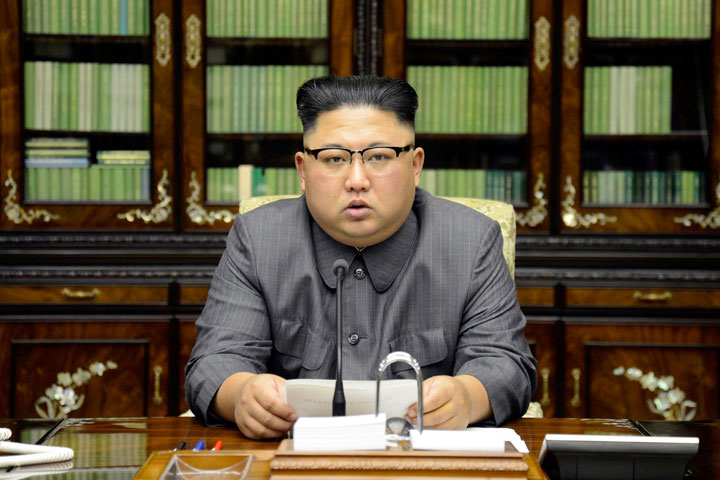One of the BBC’s newest radio stations began broadcasting across the Korean peninsula on Tuesday. And the signal was almost immediately jammed by the North Korean government, according to news reports.

BBC’s Korean-language programming was started because, “Access to accurate information about the world is a basic human right,” according to a statement by BBC World Service director Francesca Unsworth. The BBC programming, which in its first show had a segment on a possible volcano eruption in Indonesia and included a basic English lesson, is broadcast on two short-wave frequencies and one AM radio station.
“Audiences are able to receive some frequencies at the moment,” said a BBC spokesperson, noting that it was hard to tell yet whether the BBC was being specifically targeted.
The half-hour news show airs late at night when government minders are less likely to be watching.
Because they are definitely watching. “The whole system is based on control of the people,” said Martyn Williams, a longtime North Korea watcher and contributor to 38 North, a news blog run by the US-Korea Institute at Johns Hopkins University.
“One of the greatest threats to the entire North Korean system and the regime is the ability of people to communicate amongst themselves and also to interact with foreign media.”
As a consequence, the government attempts to control everything that its citizens know. All domestic media is essentially state-controlled propaganda, and access to foreign books, movies, radio and television is severely limited, said Reporters Without Borders. Accessing foreign media can lead to punishments from having to bribe police officers to imprisonment and hard labour.
“The idea is, there’s only one reality and that’s the only thing they’re exposed to,” said Williams.
But cracks are appearing in the system. InterMedia, a research firm, interviewed defectors from North Korea and found that 48 per cent of them had seen foreign DVDs and 27 per cent had listened to foreign radio, according to a 2013 report.
WATCH: North Korean propaganda film celebrating Kim Jong Un, from 2013
Defectors aren’t exactly unbiased sources or representative of the North Korean population – they’re people who hated the regime enough to risk their lives fleeing it and who were able to do so – but such surveys are one of the only ways to learn about North Korean television viewing habits.
Some defectors have reported that what they saw in foreign media influenced their decision to leave, according to Williams.
“I think it’s just spreading dissatisfaction, cracking the government’s complete control of information which is one of the central parts of the entire system. If you start to crack away at that then you start to crack away at the system as a whole,” he said.
Smuggled soaps
It’s not too difficult to buy a DVD player in North Korea, according to the InterMedia report. And while there are domestically produced DVDs, there’s also a black market in foreign ones, smuggled across the border by Chinese traders and sold under the table at local markets.
Although it’s illegal to watch foreign media, many people watch these DVDs or USB sticks filled with movies and South Korean TV shows. South Korean soap operas are popular, said Williams, and are more seditious than romance and melodrama might seem at first glance.
“It’s an escape from everyday life right? To see all these beautiful actors and actresses in swanky apartments, driving expensive cars and having dinners in nice restaurants. The love triangles and all that kind of stuff, it’s a whole escape from average life,” he said.
“But there is this interesting kind of subversive side in that even though there isn’t a message in the storyline, they are seeing life in South Korea.”
Radio and TV
Radios sold in North Korea are modified so they can only tune in to certain frequencies – government-operated North Korean stations, of course. But people do illegally “jailbreak” their radios, says Reporters Without Borders. They can then listen to South Korean stations near the border, or to shortwave foreign broadcasts like the BBC’s and similar ones from Radio Free Asia and Voice of America.
“North Korea does its best to stop the broadcasts coming in but it is the only way that exists at the moment to get current information into the country,” said Williams.
The North Korean government tries to limit what their citizens can hear. Radios can be modified, but a more effective way is to “jam” incoming signals. According to Williams, the concept is simple: the government will broadcast a whooshing or clicking noise over the same bandwidth to drown out the news.
“When someone tunes in, hopefully what they hear is the noise instead of the radio station, or they hear both but the noise is so annoying or so disruptive that people end up tuning somewhere else.”
WATCH: North Korea TV shows thousands celebrating launch of country’s first ICBM (July 2017)

North Koreans are most interested in business news and learning skills that directly help them in their everyday lives, according to the InterMedia report.
This doesn’t surprise Williams.
“A lot of them know the situation in their country and they know the reality. They don’t need to be reminded every day in a broadcast from the West that their government is evil. I think they’ve figured that out already.”
But despite recent crackdowns and government control, there’s still a huge demand for all types of foreign media, said Williams. And while it’s hard to say precisely how much people are able to get, he believes it’s making a difference. “Information is probably one of the biggest threats to the whole North Korean system. The free flow of information. Because that will breed discontent amongst people and that’s where you begin to get the possibility of some seeds being sown that could eventually lead to some sort of uprising.”
That could be years or decades away though. “I don’t think we’re anywhere near that at the moment.”



Comments